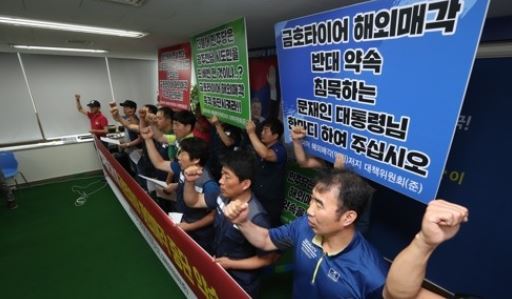Kumho Tire workers threaten strike to stop sale process
By Catherine ChungPublished : July 24, 2017 - 18:22
Workers at Kumho Tire Co. and its subcontractors on Monday warned they will go on strike unless the tiremaker's creditors stop the process to sell it to a Chinese company.
In a press conference held at the National Assembly, the joint committee against the sale of Kumho Tire to an overseas company said they will stop all production lines at the tiremaker's local plants and stage a general strike.
"The ongoing process to sell Kumho Tire to Qingdao Doublestar Co. will result in the transfer of some production volume to China from South Korea and lead to massive layoffs of local workers,"
In a press conference held at the National Assembly, the joint committee against the sale of Kumho Tire to an overseas company said they will stop all production lines at the tiremaker's local plants and stage a general strike.
"The ongoing process to sell Kumho Tire to Qingdao Doublestar Co. will result in the transfer of some production volume to China from South Korea and lead to massive layoffs of local workers,"

Kang Jeong-ho who represents the committee said over the phone.
The committee speaks for 2,900 workers at Kumho Tire and many other businesses in the supply chain.
In March, Kumho Tire's nine creditors led by the state-run Korea Development Bank signed a 955 billion won ($857.2 million) deal with Doublestar to sell their entire 42.01 percent stake in the country's No. 2 tiremaker to the Chinese tiremaker.
The deal will make Doublestar China's biggest tiremaker.
The stake held by creditors was valued at 495.78 billion won ($445 million) based on Monday's closing price of 7,470 won.
As of July, the company has a global capacity of 55 million units in eight plants -- three in South Korea and five in the United States, China and Vietnam.
Kumho Tire's net losses narrowed to 37.9 billion won for all of 2016 from 67.5 billion won a year earlier. (Yonhap)








![[Graphic News] More Koreans say they plan long-distance trips this year](http://res.heraldm.com/phpwas/restmb_idxmake.php?idx=644&simg=/content/image/2024/04/17/20240417050828_0.gif&u=)
![[KH Explains] Hyundai's full hybrid edge to pay off amid slow transition to pure EVs](http://res.heraldm.com/phpwas/restmb_idxmake.php?idx=644&simg=/content/image/2024/04/18/20240418050645_0.jpg&u=20240419100350)





![[From the Scene] Monks, Buddhists hail return of remains of Buddhas](http://res.heraldm.com/phpwas/restmb_idxmake.php?idx=652&simg=/content/image/2024/04/19/20240419050617_0.jpg&u=20240419175937)

![[KH Explains] Hyundai's full hybrid edge to pay off amid slow transition to pure EVs](http://res.heraldm.com/phpwas/restmb_idxmake.php?idx=652&simg=/content/image/2024/04/18/20240418050645_0.jpg&u=20240419100350)

![[Today’s K-pop] Illit drops debut single remix](http://res.heraldm.com/phpwas/restmb_idxmake.php?idx=642&simg=/content/image/2024/04/19/20240419050612_0.jpg&u=)